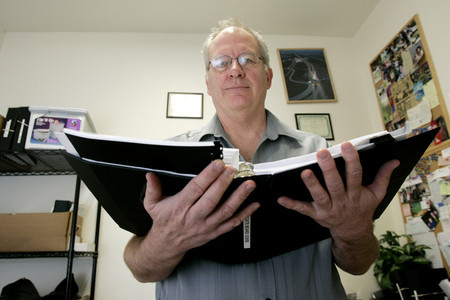Tax challenger takes complaints to court

CARSON CITY — Clark County businessman Brent Howard thought he had a chance of significantly lowering the taxes on his home and business properties.
That’s because Nevada’s county assessors have been accused of not following a constitutional requirement to assess property in a uniform and equitable way.
He has been forced to think again.
After a 90-minute hearing on Dec. 3, the state Board of Equalization rejected his arguments and supported the values for Howard’s four properties recommended by the Clark County assessor’s office.
"I’m suing," said Howard, a former unsuccessful Assembly and County Commission candidate, in a telephone interview. "I am taking this to the District Court."
Anthony Wren, chairman of the Board of Equalization, did not return calls for comment.
Howard is the first Clark County resident to challenge his property assessments on the grounds that assessors are not following the Nevada Constitution’s requirement, according to the county assessor’s office.
And it appears he is just what a conservative Las Vegas-based think tank has wanted to find, a test case that could lead to assessment parity and even lower property taxes.
The Nevada Policy Research Institute repeatedly has argued that assessors make up their own policies that overvalue property to keep money flowing into government’s treasuries.
Assessors maintain they have followed all state assessment laws, although a required manual outlining uniform assessment rules has not been updated in 10 years.
NPRI Vice President Steve Miller contends the assessors make up their own policies.
"It would kill them emotionally to give him (Howard) the kind of reduction he wants," Miller said Thursday. "It would open the door for everybody in the state to do the same thing."
Miller spoke with Howard before his appearance before the Board of Equalization, the five-member state board that hears taxpayers’ challenges of their county assessed values.
In an earlier interview, Miller said residents should not have to pay property taxes if assessors do not follow a uniform assessment policy across the state. He suggested residents appeal their assessments on the grounds that assessors are not following the constitution.
The Board of Equalization is expected to meet in January with the 17 county assessors to discuss how they value property.
Howard, the owner of BHI Bookkeeping, 2985 N. Decatur Blvd., challenged the assessments on two homes and two business properties he owns on the grounds the Clark County assessor failed to follow the constitutional requirement.
He also contended his properties were valued much higher than comparable properties in the area and were far higher than for what land and buildings have been selling for in recent months.
"To them, the law doesn’t matter, the Supreme Court doesn’t matter," said Howard, a former Assembly candidate. "Somebody has to start the ball rolling for taxpayers."
Residents in Incline Village, a pricey community on Lake Tahoe’s north shore, several years ago won a Supreme Court decision that their Washoe County properties have been valued higher than similar properties elsewhere. Their assessments were lowered to the values of the 2002-03 year.
Deputy Clark County Assessor Rocky Steele said his office went out of its way to provide Howard all of the information it had on how his properties were valued, and still that was not enough for him.
"We are following the statutes, the codes," Steele said. "We are comfortable with our valuations. If he chooses to take the next step, District Court, then that is the appropriate remedy."
Howard acknowledges that the Clark County assessor did lower the value on one of his properties by $100,000, and the lower value was accepted by the Board of Equalization.
But he still maintains the value of four acres of vacant land he owns was set at $500,000 an acre. Land in that area has been selling for about $200,000 an acre, he said.
In a letter to the Board of Equalization, Howard said that the county assessors have not been using a Nevada Tax Commission-approved manual on tax assessments.
The manual is supposed to contain rules on setting property values that meet the constitutional requirement of uniform and equal tax assessment.
With uniform rules, values on a home in one part of the state should be similar to the values of similar homes in other areas.
In a recent interview, state Taxation Director Dino Dicianno acknowledged a manual has not been updated since 1999, but disagreed assessors are breaking the law.
Dicianno said that laws now require all tax assessment matters to be approved through regulations and that attempts by the Tax Commission to pass new regulations have been thwarted by constant litigation.
Without uniform methods of valuing property, county assessors determine on their own how to assess values, and wide differences on similar property even occur in the same county, Miller said.
Contact Capital Bureau Chief Ed Vogel at evogel@reviewjournal.com or 775-687-3901.